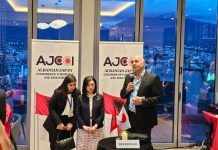Quid pro quo, Serbia should join negotiations without preconditions just like Kosova has
The image of a country in the world depends a lot on how you treat your friends and your enemies. All the polls out there have proved for years now that there is no country where America is valued and loved more than in Kosova.
This has been also the experience of many US citizens who have visited Kosova and have told wonderful stories of hospitality and gratitude.
It is rooted in the image of America as a bold but honest broker in the resolution of conflicts. In 1999, US led NATO in a military intervention that ended the fourth war of Serbia in the region. An entire decade of armed conflicts and crimes against humanity not seen since WWII was soon over and stability and cooperation returned.
Today, the United States is back in the region to solve the remaining problems in the Balkans, with Ambassador Grenell taking the lead in the talks between Kosova and Serbia, one of the last remaining conflict in this corner of Europe.
Kosova is an independent country recognized today by US, UK, Japan, Canada, 22 EU embers and by major world organizations like IMF, World Bank, IOC, FIFA etc. Its Declaration of Independence was made in accordance with the international law as determined by the International Court of Justice, in The Hague, after Serbia took the case there.
Yet, 12 years later, Serbia, with the encouragement of Russia, Iran, China and some other countries refuses to recognize the new reality in the region. It has launched an international campaign of bribery and misinformation to sabotage Kosova’s recognitions and its membership in various organizations.
Their historic and political justifications aside, this is not how countries behave in international affairs. Imagine if King George refused to recognize the United States of America, after the Revolution of 1776. Imagine if European countries refused to recognize the independence of their former colonies. Imagine if the Ottoman Empire refused to recognize Serbia’s independence when that country itself became free. The world would in chaos. We maintain a sane international system by recognizing reality.
It is telling that Ambassador Grenell achieved in a few days, what other intermediators had failed to do in months and years. It is encouraging that he is now ambitious to work towards a complete resolution of this conflict and prove to the world the power of President Trump’s diplomacy.
The sides however should respond to his invitation to talk without setting conditions. The refusal of Serbia to sit on the table because of an existing tariff is unacceptable. The talks should lead to dropping the tariff, not the opposite. Nor is Serbia willing to interrupt the actions which lead to the imposition of the tariff.
Countries should not be awarded for bad behavior or it will only be encouraged to do worse. One evergreen lesson from the Balkans is that Serbia’s nationalism cannot be appeased by submitting to its irrational demands.
Former Prime Minister, Ramush Haradinaj, imposed the tariff, not to punish Serbia, but as a response to Serbia’s campaign which aims the destruction of Kosova. The new Prime Minister Albin Kurti hinted he would drop the tariff anyway, but by establishing some sort of reciprocity. This new position has potential and should be supported.
US should not strongarm friends and reward its adversaries. The US intervention in 1999 paved the way for Serbia’s democracy and helped it return to the family of nations. However, nationalists remain in power in Serbia and far from being grateful, they will never forgive US and the West for that intervention. No matter how much we concede to them.
For twenty years Kosova and Serbia have been involved in negotiations, with Washington allowing Brussels to take the lead, while supporting it from the sidelines. The parties have regularly sat to talk without preconditions. This should change now that US is taking the lead.
______________________
Harry Bajraktari is founder and publisher of Illyria newspaper (1991-1998), an Albanian-American community leader, philanthropist and recipient of many awards, including the Honor of the Nation Order by the President of Albania, Kosova’s Presidential Medal for Merits & the White House Presidential Call to Service Award.



















